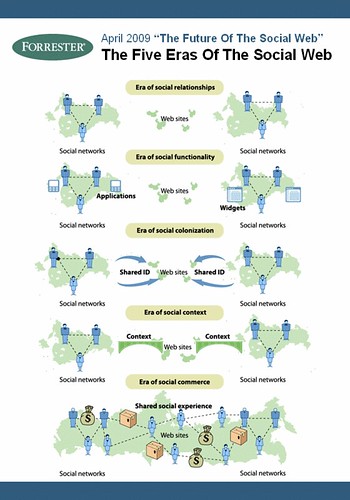20 May Why Coming “Social Commerce” Era Should Terrify Brand Marketers
Forrester’s recent report on The Future of The Social Web made some interesting predictions about where social media marketing is heading, and how major brands will need to respond. We’ve clearly moved beyond Social Relationships and into Social Functionality, and the early signs of Social Colonization are clearly upon us. If they have it right, and we end up in an era of Social Commerce, the brands getting involved today will be at a tremendous advantage. And brands that don’t seriously get involved will be watching from the sidelines in less than five years.

Next Step: Ending Walled Gardens
I’ve frequently compared Facebook to America Online back in the early 1990s. It’s a powerhouse in terms of mass market Internet consumption. It’s the walled garden — safe, clean and functional. America Online never effectively got over that, and it’s faded in terms of influence.
Facebook is trying to avoid the same fate, and many believe that Facebook Connect is only the first step of many to leading us to the era of Social Colonization. You can already leave a comment on this site and hundreds of others using your Facebook ID. As that catches on, and as Facebook makes more clever tools available to us (like the Facebook feed API that was just released), suddenly they are a force across the web.
Social Context? Don’t Bet On It
Forrester predicts that the next logical step after all this social colonization occurs is that sites will be able to use your profile information to serve you relevant content. They call it the era of Social Context. Here’s how Jeremiah describes it:
“As sites begin to recognize people’s personal identities and their social relationships, they will customize visitors’ experiences based on their preferences, their behaviors, and who their friends are. In addition to enabling more intense social applications, in this stage social networks will absorb features of email and become a base of operations for everyone’s online experience.”
I’m not going to bet the farm on that one. I can see social networks becoming a central point, but it will be very difficult for most companies to customize their own site’s experiences by user. If we go back to the 1990’s analogy again, the idea of customized content was the holy grail of web development. From simple choices (i.e., I’m a male, looking to buy a television) to complicated profiles, sites were supposed to be able to bend to our whims. It never effectively happened. I’m not sure that having my profile from Facebook or any other site will make that work for marketers going forward. The permutations are mindboggling, and sites will end up getting it wrong more than they get right.
Social Commerce Devalues Brands
It’s really step five on this progression, Social Commerce (predicted to start slowly in 2011 and mature by 2013) that should serve as a wake-up call for brand managers and brand marketers who aren’t engaging in true social media marketing. To quote the report:
“Starting about two years from now, as social networks become the repository for identities and relationships, they will become more powerful than corporate Web sites and CRM systems. Communities will become the driving force for innovation. As a result, brands will cater to communities, resulting in a power shift toward the connected consumer.”
Think it can’t happen? Most advertisers already struggle to break through the walls we’ve set up. These just may be the most formidable walls yet.
Look at record labels and television networks as the canaries in the proverbial coal mine. Record labels are struggling to reinvent themselves when bands can use tools like ReverbNation to build relationships directly with fans. And television networks, once powerful brands in their own rights, are now vessels for content. People now go to Hulu to watch shows the way our parents went to NBC for “must see TV.”
As this era matures, we’ll still want products, we’ll still want deals. We’ll still want information. But we’ll want it when we want it. And perhaps more importantly, we’ll expect it where we want it. If your brand hasn’t figured out how to be where the people are, another more savvy brand will do so.
As a social media agency, I deal with brand managers every day. Some get it and find a way to participate, even if it’s modestly uncomfortable at first. Others say, “We’ll never be able to do that because that’s not how we operate.” If Forrester is right about this prediction, and the era of social commerce is coming, I wouldn’t want to be holding stock in the companies that aren’t figuring it out.






